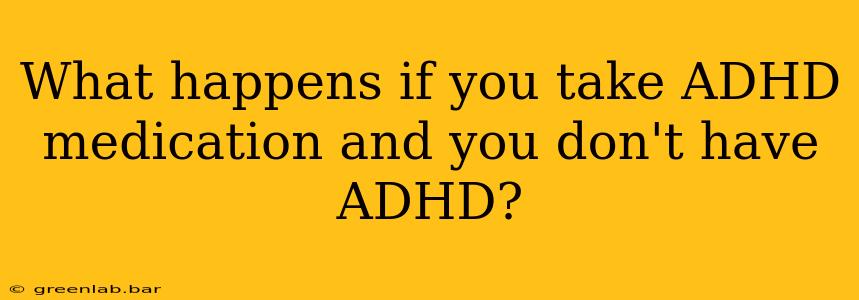Taking medication intended for Attention-Deficit/Hyperactivity Disorder (ADHD) without an actual diagnosis can have significant consequences. While the effects will vary depending on the specific medication, dosage, and individual, there are several potential risks and side effects to consider. This isn't to say that someone with a suspected ADHD diagnosis should self-medicate; instead, it's crucial to seek a professional diagnosis from a qualified healthcare provider before starting any medication.
Potential Side Effects of Taking ADHD Medication Without a Diagnosis
The most commonly prescribed ADHD medications, stimulants like methylphenidate (Ritalin, Concerta) and amphetamines (Adderall, Vyvanse), affect the central nervous system. Even without ADHD, taking these medications can lead to:
Cardiovascular Effects:
- Increased Heart Rate and Blood Pressure: Stimulants can significantly increase heart rate and blood pressure, posing risks for individuals with pre-existing cardiovascular conditions. This effect can be particularly dangerous for those unaware they have underlying heart issues.
- Arrhythmias: In some cases, irregular heartbeats (arrhythmias) can occur.
Neurological Effects:
- Anxiety and Jitters: The stimulating effects can cause excessive nervousness, anxiety, and restlessness, even in individuals without ADHD.
- Insomnia: Difficulty falling asleep or staying asleep is a common side effect, disrupting sleep patterns and potentially impacting overall health.
- Headaches: Headaches are a relatively common side effect.
- Seizures (rare but serious): In rare instances, especially at high doses, seizures can be triggered.
- Increased risk of psychosis (in predisposed individuals): There is a small increased risk in those with a predisposition to psychosis.
Other Potential Side Effects:
- Decreased Appetite: Reduced appetite can lead to weight loss and nutritional deficiencies.
- Stomach Upset: Nausea, vomiting, and abdominal pain are possible.
- Dry Mouth: This is a relatively common side effect.
- Difficulty Concentrating (ironically): While intended to improve focus, in some individuals without ADHD, it can have the opposite effect and lead to difficulty concentrating.
- Mood Swings: Irritability, mood swings, and emotional lability are possible.
- Increased risk of dependence: Taking stimulants without a medical need can lead to dependence and withdrawal symptoms upon cessation.
Legal and Ethical Considerations
Obtaining and using ADHD medication without a prescription is illegal and unethical. This practice not only puts your health at risk but also contributes to the misuse of controlled substances. Furthermore, it prevents individuals who genuinely need these medications from accessing them.
The Importance of Professional Diagnosis
The information above highlights the potential dangers of self-medicating with ADHD medication. If you suspect you might have ADHD, it's crucial to seek a professional evaluation. A qualified healthcare professional can conduct a thorough assessment, rule out other conditions, and determine the most appropriate course of action, which may or may not include medication. They can also monitor your response to any treatment and address any potential side effects.
This information is for educational purposes only and should not be considered medical advice. Always consult with a healthcare professional before starting any new medication.

